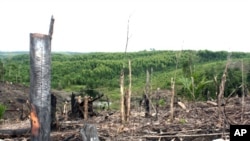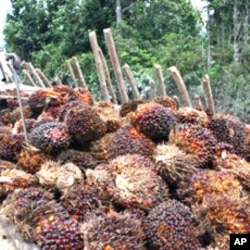International companies are cutting purchases from one of Indonesia's biggest companies, Sinar Mas, because of allegations it illegally cuts down the country's forests and plants on peat land. The environmental group Greenpeace has been leading efforts to push for more sustainable production of palm oil and paper in Indonesia.
Environmental offender
The U.S. fast-food chain Burger King recently began cutting palm oil purchases from a subsidiary of Sinar Mas, the world's second-largest palm oil producer.
The chain acted after an audit found that Sinar Mas subsidiary SMART had broken Indonesian law by planting on carbon-rich peat land. SMART commissioned the audit.
Burger King joins a list of multinational companies, including food producer Nestle and consumer products company Unilever, that are reducing purchases of palm oil and paper made by Sinar Mas units.
Clearing forests
Increasingly, consumers around the world are paying attention to the environmental group Greenpeace's campaign to protect Indonesia's forests. Greenpeace and other conservation groups say vast amounts of forest and peat land is being cleared to be used for paper and timber, or to make way for palm oil plantations.
Bustar Maitar, with Greenpeace Southeast Asia, says the audit, by BSI Group, showed Sinar Mas' role in clearing the forest. "We found that what Sinar Mas is doing is destroying rain forests, destroying endangered species' habitats and at the same time also destroying peat land," Maitar said,"which is very important to store carbon for the climate."
Mea culpa
Sinar Mas originally denied it was planting on peat land, although it now acknowledges there is a problem. The company says, however, the amount of land involved is much smaller than Greenpeace alleges.
SMART says it is working to safeguard the environment, and that by 2015, all production will be sustainable.
"SMART recognizes this non-compliance in relation to 1.8 percent of area that was planted on deep peat land and where possible," said Daud Dharsono, SMART's president director. "SMART has since taken the necessary remedial actions, including reinstating of the land."
Palm oil is found in thousands of products - from pastries to cosmetics to bio-fuel.
Future expansion
Indonesia is the world's biggest producer, and the 20 million tons it produced last year met almost half of global demand. Environment Ministry figures show Indonesia plans to add 18 million more hectares of palm oil plantations over the next decade.
Conservation groups fear that much of the increase could come at the expense of Indonesia's forests and peat land.
Palm oil advocates say it is possible to increase production and protect the forests. The Roundtable of Sustainable Palm Oil, or RSPO, is the only industry-standard mechanism to certify sustainable palm oil practices worldwide.
But environmental groups call the RSPO ineffective. Only 12 oil palm growers in Indonesia are certified, out of thousands. Greenpeace says unless more are certified, Indonesia's forests remain under threat.
Johan Verburg is the head of the RSPO's grievance board. He says the organization will send a warning letter to SMART about Greenpeace's report. "There is clearly a legitimate case, and since the purpose of the RSPO is to move toward sustainable production and use, we are getting into dialogue with this member in order for it to improve its practices," Verburg said.
Environmentalists say the systems to monitor and certify sustainable palm oil production lag behind consumer demand for green products.
New technology
Since there is no fast certification process, some consumer-goods companies are finding new ways to show they are environmentally friendly.
Business management company SAP offers software that allows companies to measure their compliance with environmental laws and industry regulations.
SAP's Simon Dale, based in Singapore, says the software can measure a company's carbon footprint and the sustainability of its products. "The companies are using our products to manage the recipe of their products in some case. So as part of ensuring that they are securing sustainable products, that's an element of that, and the other part is if the products through the supply chain are being tracked as being from sustainable sources, that's another angle where a customer would apply our solutions."
Dale says the software helps companies engage directly with their customers on environmental issues and show what they are doing to protect the planet.





